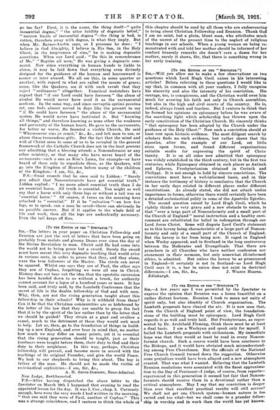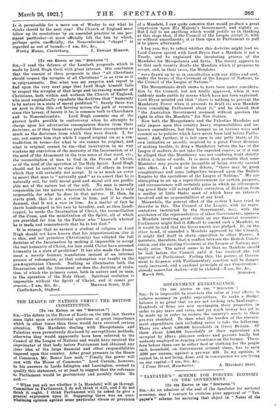[To THE EDITOR OT THE " SPECTATOR."] Sia,—A few years
ago I was permitted by the Spectator to express the opinion that Reunion was a house beautiful on a rather distant horizon. Reunion I took to mean not unity of spirit only, but also identity of Church organization. The Lambeth proposals have cleared the air. It is now seen that, from the Church of England point of view, the foundation- stone of the building must be episcopacy. Lord Hugh Cecil regards it as well and truly laid. But Presbyterians, as repre- sented by Dr. Archibald Fleming, think there must be at least a dual basis. I am a Wesleyan and speak only for myself. I hailed the Lambeth proposals with enthusiasm. My immediate hope was that they would at least be read in every Noncon- formist church. Such a course would have been courteous to the Bishops, and it would have obviated much misunderstand- ing among Free Churchmen. But the officials of the National Free Church Council turned down the suggestion. Otherwise some prejudices would have been allayed and a new atmosphere created. That was what I wanted. Believing that the Lambeth Reunion resolutions were associated with the finest approxima- tion to the Day of Pentecost—I judge, of course, from reports— experienced in this generation it seemed but fair that Noncon- formists should receive them in a devotional rather than a critical atmosphere. May I say that my conviction is deeper than ever that excellent practical results will still accrue? We shall not get one Church system—human nature is too varied and too vital—but we shall come to a grander fellow- ship in worship and in work than the world has yet known.
Is it permissible for a mere son of Wesley to say what he thinks should be the next step? The Church of England must follow up its resolutions by an amended practice in one per- tinent particular—it must officially lift the ban by which, perhaps quite unofficially, the Nonconformist "chapel" is regarded as out of bounds.—I am, Sir, &c.,



































 Previous page
Previous page